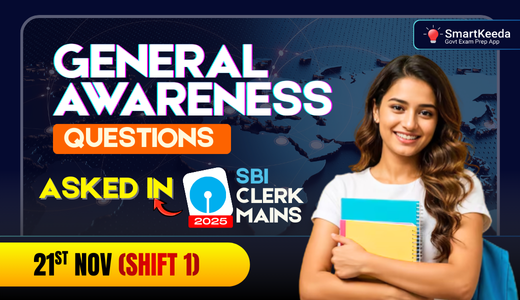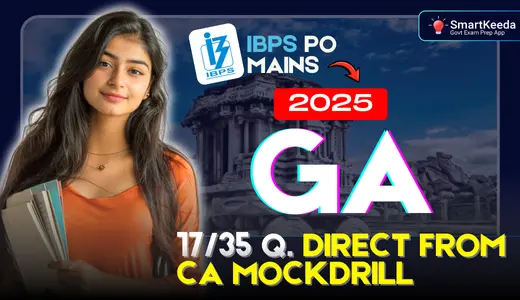How to Prepare for Bank Exams after Graduation Self-Study Tips & Tricks
A career in the banking sector is highly preferable among graduates because of the lucrative packages, career aspects, and various perks and allowances offered by the banks to their staff. The banking sector is one of the most sought-after careers from the financial security and job security point of view.
For all the fresh graduates wondering how to get a bank job after college, IBPS, RRB, and SBI offer the perfect opportunity. To simplify your search, we have come up with a detailed article to help you get a better understanding of the banking exams. In this article, we are going to cover all the important queries regarding the banking examinations that the aspirants search for over the internet such as:
- Why should I opt for a career in banking after graduation?
- How to prepare for bank exams after graduation?
- How to prepare for the upcoming 2023 Bank exams?
- How to prepare for bank exams at home without coaching?
- Self-study tips for bank exam preparation.
.jpeg)
Every year, IBPS holds a common written examination to recruit candidates for a variety of positions in different banks. On the other hand, the SBI and the Reserve Bank of India selection boards hold regular examinations for various positions. However, several other banks have their own procedure to fill the gap. Cracking a banking exam is more about strategy than sheer hard work. If we talk about the difficulty level, bank exams are not very difficult if you go through the examination pattern, and the level of questions asked in these exams. What makes them a hard nut to crack is the level of competition these days.
Through this article, we’ll share a detailed preparation strategy for your upcoming 2023 banking examinations, and give you a clear idea of the process of making a career in this sector after graduation, but before that let us understand why should you opt for a career in this sector.
Why should I opt for a career in banking after graduation?
If you have completed your graduation and seeking good career opportunities in the banking sector, there might be a “WHY?” in your mind before stepping into the banking preparation.
To clear this “WHY?”, we have tailored the top 7 benefits offered by banks to their employees that will motivate you further to put extra effort into your preparation:
- Job security: With the banking sector continually growing, the sector offers job security with steady career growth. Apart from this, banks offered their employees stability and dependability.
- Competitive salary: One might not feel motivated to work in a sector if they are not aware of the monetary benefits one is going to get in that sector. The banking sector provides handsome salaries to their employees in India and abroad. The average annual salary in Public Sector Banks In India is INR 12.3 lakhs.
- Opportunities for promotion: Banks provide an excellent opportunity for growth and development. A probationary officer has an excellent career path depending on the performance of the job. PO is Scale I level Assistant Manager and nowadays within 2–3 years, one becomes a manager by written exam and interview.
- Great career option for women: The banking sector has several women-friendly policies to help them thrive professionally as well as personally. Apart from flexible leave policies, women employees can request a transfer to a location of their choice to avoid having to live away from their families
- Excellent work-life balance: Banking jobs have fixed timings. Therefore one can get enough spare time to spend with family and enjoy a good work-life balance.
- Additional benefits: Bank employees are entitled to outstanding perks, incentives, and special allowances, including medical insurance, disability insurance, sick leave, paid vacation, paid leave, retirement benefits, concessions, a minimum rate of interest on loans, pension edges, etc. The bank staff also receive reimbursement for transportation and newspapers.
- Social Prestige: Banking is undoubtedly a desirable and prestigious career. It’s well-paid, populated by graduates from top universities, and dominated by overachievers.
Owing to the benefits, perks, and allowances offered to the employees by this sector, the banking sector has shaped into a promising landscape for fresh graduates and young professionals.
Is it possible to crack bank exams at home with self-study?
The first question that pops into the mind of every aspirant who is a graduate or is about to be graduated and has the desire to settle his/her career in the banking sector is “How to crack banking exams at home without coaching? Or “Is it possible to crack bank exams through self-study?”
To this, our answer is Definitely Yes!! Cracking a banking exam without coaching is very much possible. You'll be surprised to know that most of the students who qualify for these exams do this by self-study. However, with growing competition, making it through any banking examination demands consistent hard work and strategy with proper knowledge of the respective exam. To compete and succeed in the banking examination after graduation, you must have a thorough knowledge of the examination pattern, syllabus, and selection procedure.
Let’s dive deep into the details. By the end of the article, we’ll try to give you a better understanding of preparing for the Banking examinations at home through self-study.
How to prepare for bank exams after graduation?
The first step of stepping into the banking exam preparation after graduation is to have a thorough knowledge of the syllabus & exam pattern. Knowing the syllabus and exam pattern will help you prepare the study plan. It will help you to sort out the important topics and start your preparation.
If we talk about the examination pattern for prelims, the recruitment agencies follow a set pattern and therefore the question paper is almost predictable. Attempting examination pattern-based mocks can help you a lot in making you familiar with the pattern and syllabus of the exam and giving you an upper hand in clearing the exam.
• Preliminary Examination
The preliminary examination is conducted in online mode. This phase is generally divided into 3 sections - ENGLISH, REASONING, and QUANTITATIVE APTITUDE. You are given 100 questions to attempt in a duration of 1 hour. Each question carries 1 mark & there is a penalty for wrong answers marked in the Objective Tests of both Preliminary and Mains exams. A wrong attempt will lead to a penalty of one-fourth of the marks assigned to that question. The preliminary phase is qualifying in nature, i.e, the score obtained in the preliminary examination is not added to the further processes.
| S.No. | Name of test | No. of questions | Maximum marks | Duration |
| 1. | English Language | 30 | 30 | 20 minutes |
| 2. | Quantitative Aptitude | 35 | 35 | 20 minutes |
| 3. | Reasoning Ability | 35 | 35 | 20 minutes |
| Total | 100 | 100 | 60 minutes |
• Mains Examination
Pre-exams of the bank are more of a speed test whereas the mains exam checks your knowledge at a conceptual level. Mains is the scoring part of the recruitment process and you need to score well in this phase to be on a shortlist. This phase is generally divided into 4 sections - Reasoning & Computer Aptitude, General/ Economy/ Banking Awareness, English Language, and Data Analysis & Interpretation
There is no specific exam pattern for the bank mains exam as different banking exam follows a different pattern in the paper. Therefore you need to go through the pattern of each exam in detail before preparing for it. Given below table shows the examination pattern for IBPS PO mains:
| S. No | Name of test | No of questions | Maximum marks | Duration |
| 1. | Reasoning Ability & Computer Aptitude | 45 | 60 | 60 minutes |
| 2. | English Language | 35 | 40 | 40 minutes |
| 3. | Data Analysis and Interpretation | 35 | 60 | 45 minutes |
| 4. | General/Economy/ Financial Awareness | 40 | 40 | 35 minutes |
| Total | 155 | 200 | 3 Hours |
Being familiar with the examination pattern is just not enough. You should be fully aware of the syllabus and the difficulty level of the questions asked in the examination. The best part is that almost all banking exams mostly follow the same syllabus.
Click here to know the syllabus for the banking examination.
• Descriptive Writing
Descriptive writing is a part of the main examination and it is the easiest part of the exam. You are required to choose and write an Essay and a Letter out of the given topics. The total time allotted for the descriptive part is 30 minutes. Scoring well in this section can be a cakewalk for you if you are aware of the latest happenings in and around the world and have a good knowledge of the format for formal/informal letter writing.
• Interview
An interview is the last stage of the Bank PO examination. Candidates who clear the written examinations are called for an interview. This round is a very important part of the selection process.
During this round, the officials try to check your knowledge, opinions, communication skills, and your fitness for the job. This is also the scoring part of the examination process and the marks obtained in this round are added to the final merit.
The clerical and assistant level examination has no interview process. If you have successfully cleared the written exam and the document verification process, you will get a job.
Topic-wise self-study preparation plan for banking exams
Once you have a clear understanding of the examination pattern, syllabus, important topics, marking schemes, cut-off, and the number of safe attempts, you will be able to develop an effective study plan and make the most out of your preparation. Let us now give you a topic-wise preparation plan for the various bank exam.
1. Quantitative Aptitude
Quant has always been the most difficult section in banking exams as this section can consume a lot of your time if you do not have good calculation skills besides having good conceptual knowledge. Many candidates face difficulty in attempting the required number of questions within the stipulated time in this section.
Data Interpretation, Sequence & Series, Quadratic Equations, Ratio, Proportion Percentage & Averages, Simplification, etc are the main topics that should be focused on to score well in this section. Apart from that, the following steps can help you in scoring well in this section:
- Create & use short tricks: A knowledge of short-tricks will help you in having that extra edge over your competitors. You can devise your own short tricks while practicing which will certainly help you to save time and maximize your attempts in the banking examinations.
- Clear your basics: Before entering the field of short tricks, one should make it clear how that trick was created in the first place. Each short trick has some shortcomings. A short trick created for a particular type of question may not apply to other questions on the same topic.
- Reduce the use of pen and paper: You should try to reduce the use of pen and paper as much as possible and train your mind to mentally deal with the questions.
- Work on your mental calculation skills: Doing random calculations mentally during your preparation phase will help you to sharpen your mental calculation skills which will help you to save your calculation time and will work as a confidence-booster in the banking examination.
- Learn the Cubes and Squares by heart: Learning squares from 1-30 and cubes from 1-15 will help you to improve your calculation speed and attempt more questions in the saved time.
- Practice and practice: You become what you consistently practice, therefore you should consistently practice the above steps through the mock tests to achieve the required speed and accuracy.
2. Reasoning Ability
Reasoning can be the most scoring part of your exam once you gain a deeper understanding of the topics asked in this section. Since there is no theory part that you need to cover in the preparation of the Reasoning Ability. The key is to pay attention to the type of questions asked and practice them consistently
- Begin with the easy topics: Begin with the easy topics asked in this section like Syllogism, Inequalities, Coding-Decoding, Blood Relations, Ranking, Direction Tests, Alphanumeric Series, or whatever you consider as your strength. Scoring well in these topics will boost your confidence and also save you time for the tricky ones.
- Attempt Puzzles daily: You must understand that if you’re good at solving puzzles, you’re always going to score well in this section because more than half of this section consists of puzzles. To become good at solving puzzles there's just one thing that u have to do and that is you need to practice them regularly in a time-bound manner.
- Skip if you get stuck: Do not take any of the questions to your ego and master the art of skipping. Getting hooked up with a question can be a huge risk. If you are unable to solve any question in the first go, mark it and move on to the next question without wasting a second. Once you are done with all the easy questions, move on to the marked ones.
- Read the question carefully: Proper reading and understanding of the questions is a must, especially in the reasoning section. If you missed a single piece of information while solving a question, it might cost you your precious time. Therefore, making a proper blueprint of the given question in your mind will help to understand the requirement of the question and make it easy to solve.
3. English Language
The English Language is one of the most important sections in banking examinations, be it prelims or mains, scoring well in this section can easily help you build a good overall score. For this section, the first thing that you should keep in your mind is that the banking exams do not test your reading or writing skills in English, they test your concentration, patience, and understanding of the language.
- Reading, reading, and reading. Reading can play a great role in improving your English. Regularly read English newspapers (prefer the ones with moderate language like TOI, HT, or Indian Express). This might be a conventional way to learn English but it is still the most effective one. So, try to spend at least 1 hour with the newspaper and read the content with full concentration.
- Daily learn new words and try to put them into use: Memorizing 10 new words daily and using them in your daily life can slowly strengthen your vocab with minimized efforts. The more you indulge in English, the more you become comfortable with it.
- Play short English quizzes: Quizzes can help you memorize new words and advance your English level with minimum effort. For this, you can download the Qudoo app where you can play short quizzes with live opponents on the platform. Qudoo is India’s first Education-Gaming-Social platform that keeps you engaged and motivated to learn more.
- Learn through the root words: This is a powerful method to strengthen your vocabulary smartly. Instead of learning 20 new words, you can learn 2 roots and about 10 words for each root word. For example, you can remember "cide" as the root word for "killing" you can easily There are no theory materials used
4. General/Economy/ Financial Awareness
General Awareness is an indispensable part of the mains in banking exams and you certainly need to score well in this section in order to assure your final selection. Since this section has no fixed syllabus, it becomes very difficult for the candidates to predict and prepare for it. You can go through the following steps are understand the strategy to ace this section of the banking examinations:
- First, you need to go through the previous year’s papers and understand the topics on which the IBPS, SBI, and other organizations focus more. Generally, they ask questions related to the economy, banking, and finance. Cover the current affairs of at least 6 months before the examination, and focus more on the last three months.
- To cover all the important current events, you don’t even require to waste your time searching for free sources. Every month, Testzone provides the top current affairs of the previous month in form of Full Length Mocks named 'CA Mock Drills'.
- Each month you will be getting around 6-7 Current Affairs Mocks with 100 most important Current Affairs Questions in each and these Current Affairs Mock Tests will be followed by MockDrill 200 Current Affairs Mock Test in which your learning from the past 6-7 Current Affairs Mocks is tested. In a nutshell, you’ll get all your Current Affairs Practice needs fulfilled right on one platform
- Retention is the biggest challenge in this section, therefore you should regularly revise everything you have read and attempt mocks to validate your knowledge.
Importance of mock tests in your banking exam preparation
The more you sweat in practice, the less you bleed in battle!
A mock test is an integral part of your banking exam preparation journey and there is absolutely no substitute to it. It is one of the key factors in conquering this fierce competition. With the heaps of test preparation material available at the online platforms, consistent & deliberate practice through reliable mock tests is the only way that can help you stand out. Therefore, you need to choose a mock test series that helps you judge your potential and work on your weak areas much before the actual examination.
Here is how practicing through testzone mock tests can help you in giving an edge over other aspirants:
- Discovers your weaknesses: The highly detailed, error-free analytics report on your strengths and weaknesses designed by Testzone (smartkeeda) helps you discover the weak spots of your performance that actually can limit you from achieving your dream job. It helps you acknowledge the loopholes in your preparation and reframe your approach to help you perform better in the upcoming tests.
- Time management: Testzone plays a key role in helping you manage time. It keeps a track of your spent time on each question in each section and gives you a clear idea of the topics that consumed most of your time. This allows you to discover better techniques to solve those questions in the given time and manage your time better.
- Improves your question selection: Mock tests are the simulation of the actual exam, therefore, practicing a mock test daily gives you a good idea of the examination pattern and syllabus for the banking examinations and helps you wisely decide the type of questions that should be attempted first to maximize your score in the exam.
- Prepares you for the challenges: Practicing different types of assessments during your test preparation motivates you to face the challenging questions you might face in the exam head-on. They also provide you with a better perspective of what kind of questions might appear in the exam. Testzone has a combination of patterns with a variety of questions to prepare you for the worst. You can jump to different difficulty levels according to your preparation.
- Helps you understand the topper’s strategy: Toppers are not born with the extraordinary talent to succeed in tests, they slowly develop such habits through consistent practice and experience. Testzone compares your performance in each mock test with the topper’s and helps you understand how he approached the test to perform better than you.
- Keeps a track of your improvement: Testzsone gives you an idea of how better are you at challenging yourself during your preparation by comparing your current performance with the last one. A personalized graphical report of your performance helps you understand the level of your consistency throughout your test preparation. This assists you in building an effective strategy to maximize your scores in the examination.
Final Words
This brings us to the end of the article. Now that we have provided you with all the required information regarding the preparation for banking exams, we hope you build an effective roadmap and easily ace the banking examinations with a good score. Stay calm and prepare consistently. Right preparation with the right attitude will definitely lend you a position in the banking sector.
All the Best!
Thanks & Regards
(Team Smartkeeda)








